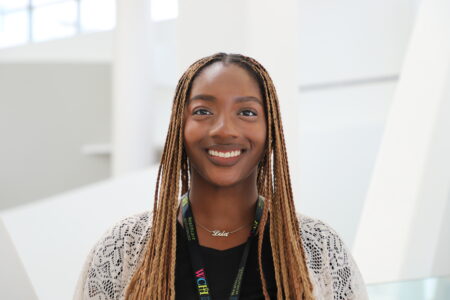What sparked your interest in healthcare?
I remember sporting a plastic stethoscope and playing “doctor” with my family as a kid. From poking my father in the forearm with a plastic needle to taking my family’s temperatures when they were sick, this childhood game helped me realize that I’ve always wanted to put myself in a position where I’m helping others. As I grew older and diversified my experiences, I learned more about inequitable access to healthcare in certain communities, such as Indigenous, immigrant, and racialized communities. Learning about the importance of education and accessible healthcare in underserved areas inspired me to become a passionate advocate for healthcare equity. I hope to nurture and catalyze this passion as I continue in the healthcare field
What interests you most about the area of research you’re working in and why?
One of the things that interests me most about working in the Familial Breast Cancer Research Unit is learning about the whys and hows of cancer development. Only a small portion of cancers are genetic – the rest occur sporadically, and the area of research I’m working on aims to look at other factors that may impact cancer growth.
What has been your favourite/most enjoyable part about being in ESSP?
My favourite part about being in the ESSP has been connecting with other like-minded individuals who share my passion for healthcare and equity. I’ve learned a lot from the people around me, and I’m grateful for the privilege of expanding my knowledge in different areas of healthcare. From attending weekly presentations to participating in panel discussions, being in this program has made me appreciate the time, effort, and sheer number of people that go into a research project. Meeting such hardworking individuals who are committed to lifelong learning has reassured me that the future of healthcare is in good hands.
Share a fun fact or surprising discovery you stumbled upon during research that made you say, “Wow, I didn’t see that coming!”
During my time working in the Familial Breast Cancer Research unit, I learned that individuals with a BRCA gene mutation have an increased lifetime risk of developing breast or ovarian cancer. While individuals without a gene mutation have around an 11% lifetime risk of developing breast cancer, individuals with a BRCA gene mutation can have around a 70% lifetime risk of developing this cancer. This huge jump shows the importance of continued research to analyze the risks associated with developing breast cancer and the preventative measures individuals can take. Cancer doesn’t just affect a single person, but the family and community around them – it’s crucial to investigate the disease as much as possible to come up with findings that can holistically benefit human health.
What are your goals for the future and how do you envision leveraging your experiences from this program to contribute to that?
In the future, I hope to become a physician! I feel that this role will best equip me to advocate for patients and impact their lives in a meaningful way. Being in the Emily Stowe Scholars Program has taught me critical thinking skills and has given me insight into some of the challenges that come with conducting research. It’s also exposed me to some areas that I believe need further research, such as the role race and socioeconomic status can play in a person’s health. While my primary goal is patient care, I also want to engage in research as a physician to better understand healthcare in the context of marginalized communities. Overall, I hope that my experiences in this program will stay with me on my journey to becoming a doctor.
